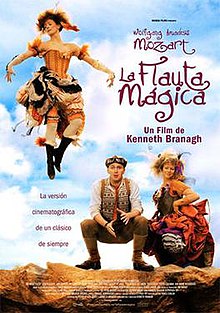The Magic Flute (2006 film)
This article may require cleanup to meet Wikipedia's quality standards. The specific problem is: the article requires expansion in certain areas and needs improved referencing. (July 2018) |
| The Magic Flute | |
|---|---|
 Spanish poster of The Magic Flute | |
| Directed by | Kenneth Branagh |
| Written by | Emanuel Schikaneder (Libretto) Kenneth Branagh (Adapted for the screen by) Stephen Fry (English libretto and dialogue) |
| Produced by | Pierre-Olivier Bardet Simon Moseley |
| Cinematography | Roger Lanser |
| Edited by | Michael Parker |
| Music by | Wolfgang Amadeus Mozart (Chamber Orchestra of Europe conducted by James Conlon) |
| Distributed by | Revolver Entertainment Les Films du Losange |
Release date | September 2006 (Toronto International Film Festival) |
Running time | 133 minutes |
| Countries | United Kingdom France |
| Language | English |
| Budget | US$27,000,000[1] |
The Magic Flute is Kenneth Branagh's English-language film version of Wolfgang Amadeus Mozart's singspiel Die Zauberflöte. The film is a co-production between France and the UK, produced by Idéale Audience and in association with UK's Peter Moores Foundation.
Interpretation[]
In November 2005, it was announced that, as part of the 250th anniversary celebration of Mozart's birthday, a new film version of The Magic Flute, set during World War I, was to be made, directed by Kenneth Branagh, with a translation by Stephen Fry.[1] The film was presented at the Toronto International Film Festival on 7 September 2006, at the Venice Film Festival on 8 September of that year, and released in Switzerland on 5 April 2007.
The film, with a soundtrack performed by the Chamber Orchestra of Europe conducted by James Conlon, is the first motion picture version of the opera specifically intended for cinemas. Ingmar Bergman's 1975 film version was made for Swedish television and only later released to theatres. Branagh's version was shot in Super 35 and released in anamorphic widescreen, while Bergman's was filmed in Academy ratio for television sets of the 1970s. The story, which has been updated to a World War I setting, follows the structure of the original opera libretto. Tamino is sent by the Queen of the Night to rescue her daughter Pamina after Sarastro has apparently kidnapped her. His sidekick is Papageno, a man who uses underground pigeons to check for poison gas. Sarastro, in charge of a field hospital, is Pamina's father.
A DVD of the film was released in France in August 2007 with a bonus soundtrack CD (lasting around 79 minutes) and a "Making of" featurette (50 minutes).[2] The film has also been released on DVD in the Netherlands (in a three-disc set), Finland, Argentina, and Japan.
Revolver Entertainment gave the film a theatrical release in the United States in June 2013, seven years after its premiere in Europe.
Casting[]
Branagh consulted with conductor James Conlon over casting choices. René Pape, who has sung and acted the role of Sarastro in several productions of the opera onstage, is the best-known singer in the entire film.[3]
- Joseph Kaiser as Tamino
- Benjamin Jay Davis as Papageno
- Amy Carson as Pamina
- René Pape as Sarastro
- Lyubov Petrova as Queen of the Night
- Tom Randle as Monostatos
- Silvia Moi as Papagena
- Liz Smith as Old Papagena
- Teuta Koco, Louise Callinan, Kim-Marie Woodhouse as The Three Ladies
- William Dutton, Luke Lampard and Jamie Manton as The Three Boys
Release[]
The film was made on an estimated budget of $27 million.[1] On 11 June 2013, seven years after its premiere, the film was finally released on a Region 1 DVD in the United States.
Critical reception[]
Variety's Derek Elley gave the film a mixed review.[4] Total Film mistakenly blamed Mozart for the "silliness of the story".[5]
In 2009, three years after the release of the film, Roger Lanser received a Cinematographer of the Year Award from the Australian Cinematographers Society for his work on The Magic Flute.[6]
References[]
- ^ a b c "Branagh to make Mozart opera film". BBC News. 1 November 2005. Retrieved 14 April 2007.
- ^ Review of European DVD in LA Times
- ^ "Branagh's magical, mistreated 'Flute'". Los Angeles Times. 24 August 2008.
- ^ Elley, Derek (7 September 2006). "The Magic Flute Movie Review". Variety.
- ^ Film, Total. "The Magic Flute Review". TotalFilm.com. Retrieved 24 January 2014.
- ^ "Roger Lanser ACS - Australian Cinematographers Society". www.cinematographer.org.au. Retrieved 8 December 2020.
External links[]
- English-language films
- 2006 films
- 2000s musical fantasy films
- Films with screenplays by Stephen Fry
- British films
- British musical fantasy films
- French films
- French musical fantasy films
- English-language French films
- Films directed by Kenneth Branagh
- Films set in the 1910s
- Films based on The Magic Flute
- Opera films